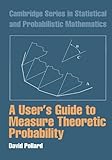Found in 2 comments on Hacker News
carterschonwald · 2009-03-24
· Original
thread
http://www.amazon.com/Theoretic-Probability-Statistical-Prob... is a great book if you want to learn advanced probability theory and techniques.


Here's where it gets less basic: say you want to look at temperature over time, but you don't want to model temperature as a variable that's measured daily, or hourly, or even every second (secondly?), but you want to model it as a process that evolves in continuous time. That's where the theory gets messy. Not necessarily at the level of a user of this theory, but definitely at the level of proving that the math you want to use is allowed.
If you actually need an introduction to that sort of probability, Lawrence Evans (Berkeley) has some old lecture notes aimed at undergrads [1] that he turned into a book [2]. If (more likely) you want standard measure-theoretic probability theory (as opposed to what's taught to undergraduates), David Pollard's book is pretty good [3].
I'm sure that @graycat will scoff at those recommendations, but his reading list would be considered excessively hardcore and time consuming even for a graduate student in math, which I'm assuming you're not.
[1]: http://citeseerx.ist.psu.edu/viewdoc/download?doi=10.1.1.416...
[2]: http://www.amazon.com/An-Introduction-Stochastic-Differentia...
[3]: http://www.amazon.com/Theoretic-Probability-Statistical-Prob...
ps: after looking at it again, the intro in Evans's notes is as gentle as it's going to get, so start there. And (as you'll find out, unless you're some sort of savant) this shit's hard. If you actually want to understand this stuff, graduate coursework is probably the only practical way to do it.